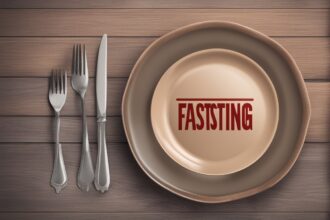Intermittent fasting (IF) has surged in popularity as a flexible and effective approach to weight loss, improved metabolism, and overall health. However, with its rise in fame, numerous myths and misunderstandings have also surfaced. In this comprehensive guide, we’ll debunk some of the most common intermittent fasting misconceptions to help you navigate this dietary practice with clarity and confidence. Whether you’re a beginner or a seasoned faster, understanding the truth behind these myths can make all the difference in achieving your health goals.
What Is Intermittent Fasting?
Before diving into the myths, let’s briefly clarify what intermittent fasting entails. IF is not a diet but rather an eating pattern that cycles between periods of eating and fasting. Popular methods include the 16/8 method (fasting for 16 hours and eating during an 8-hour window) and the 5:2 diet (eating normally for five days and restricting calories on two non-consecutive days). Despite its simplicity, many common intermittent fasting misconceptions have led to confusion about its benefits and challenges. Let’s clear the air by addressing these misunderstandings head-on.
Myth 1: Intermittent Fasting Means Starving Yourself
One of the most pervasive common intermittent fasting misconceptions is that it equates to starvation. This couldn’t be further from the truth. Intermittent fasting is about timing your meals, not depriving yourself of food. During eating windows, you’re encouraged to consume nutrient-dense meals to meet your caloric and nutritional needs. Unlike starvation, which can lead to muscle loss and metabolic slowdown, IF is designed to promote fat burning while preserving muscle mass when done correctly.
Research supports this distinction. A study published in the American Journal of Clinical Nutrition found that intermittent fasting can help maintain lean body mass while reducing fat, especially when paired with resistance training [1]. If you’re new to IF, start with a manageable fasting window and focus on balanced meals. For more tips on getting started, check out our Intermittent Fasting for Beginners Guide.
Myth 2: Intermittent Fasting Slows Down Your Metabolism
Another widespread myth among the common intermittent fasting misconceptions is that fasting slows your metabolism, making weight loss harder. In reality, short-term fasting can actually boost metabolic rate. During fasting periods, your body shifts to burning stored fat for energy, and levels of norepinephrine—a hormone that enhances fat breakdown—increase, potentially revving up your metabolism.
A 2018 study in Obesity showed that alternate-day fasting led to a slight increase in metabolic rate among participants [2]. However, prolonged calorie restriction or extreme fasting without proper nutrition can have the opposite effect, so balance is key. Learn more about maintaining a healthy metabolism during IF in our post on Fasting and Metabolism.
Myth 3: You Can Eat Anything During Eating Windows
A particularly misleading belief among the common intermittent fasting misconceptions is that you can eat whatever you want during your eating windows without consequences. While IF offers flexibility, it doesn’t give a free pass to indulge in junk food. The quality of your diet still matters immensely for weight loss, energy levels, and overall health.
Filling your eating windows with processed foods high in sugar and unhealthy fats can negate the benefits of fasting, such as improved insulin sensitivity and reduced inflammation. A review in the Annual Review of Nutrition emphasizes that combining IF with a nutrient-rich diet maximizes health outcomes [3]. Focus on whole foods like vegetables, lean proteins, and healthy fats. Need meal ideas? Explore our Healthy Meals for Intermittent Fasting guide.
Myth 4: Intermittent Fasting Causes Muscle Loss
Many fitness enthusiasts shy away from IF due to the fear of losing hard-earned muscle, making this one of the most debated common intermittent fasting misconceptions. While it’s true that prolonged fasting or severe calorie deficits can lead to muscle breakdown, properly structured intermittent fasting—especially when combined with adequate protein intake and strength training—can preserve muscle mass.
Studies, such as one published in the Journal of Translational Medicine, indicate that intermittent fasting can support muscle retention during weight loss by elevating growth hormone levels during fasting periods [4]. To protect your gains, prioritize protein-rich foods and maintain a consistent workout routine. For more on this topic, read our article on Fasting and Muscle Building.
Myth 5: Intermittent Fasting Isn’t Safe for Everyone
Lastly, among the common intermittent fasting misconceptions is the belief that IF is universally unsafe or unsuitable. While intermittent fasting offers numerous benefits, it’s not a one-size-fits-all solution. Certain groups—such as pregnant or breastfeeding women, individuals with eating disorders, or those with specific medical conditions like diabetes—should approach IF with caution or avoid it altogether unless under medical supervision.
According to the Harvard Medical School, intermittent fasting can be safe for most healthy adults, but consulting a healthcare provider is crucial for those with underlying health issues [5]. If you’re unsure whether IF is right for you, speak with a doctor or dietitian. For tailored advice, see our post on Who Should Avoid Intermittent Fasting.
Conclusion: Busting the Myths for Better Fasting
Intermittent fasting can be a powerful tool for improving health and achieving weight loss goals, but only when approached with accurate information. By debunking these common intermittent fasting misconceptions, we hope to empower you to make informed decisions about your fasting journey. Remember, IF is about balance, not deprivation, and its success depends on proper nutrition, realistic expectations, and personalized adjustments.
Have you encountered other myths about intermittent fasting? Share your thoughts in the comments below, and don’t forget to explore our other resources for more evidence-based insights on fasting and wellness.
Disclaimer: The information provided in this article is for educational purposes only and should not be considered medical advice. Intermittent fasting may not be suitable for everyone, and individual results may vary. Always consult with a healthcare professional or registered dietitian before starting any new dietary or fasting regimen, especially if you have pre-existing health conditions or are on medication. We are not responsible for any adverse effects resulting from the application of the information discussed in this post.






